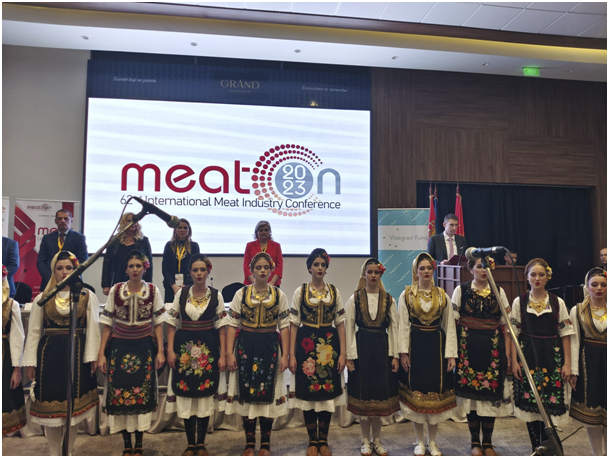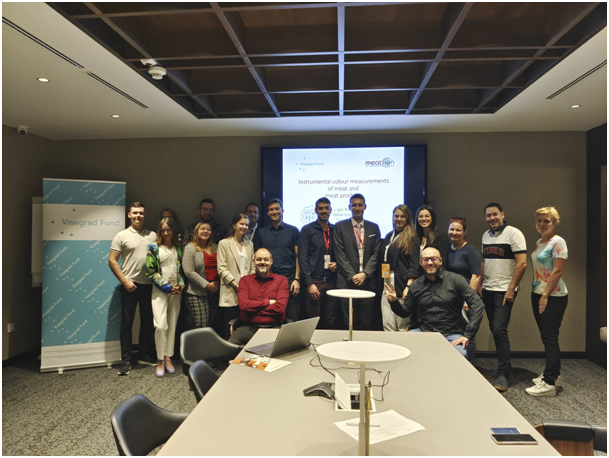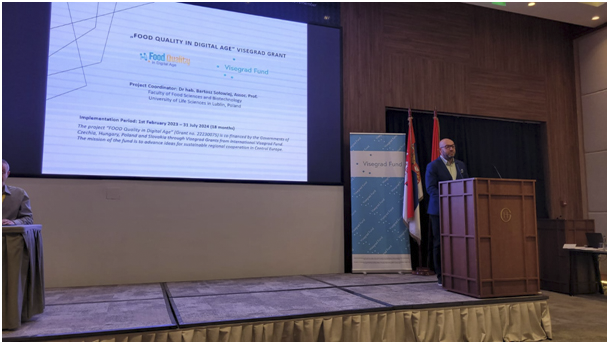Међународни пројекти
FOOD Quality in Digital Age
30.10.2024.
“FOOD Quality in Digital Age” project e-leaflet now available!
The partners of the project “FOOD Quality in Digital Age” are excited to announce the release of a catalogue of tools, methods and approaches on digital food quality evaluation outlining innovative research methods offered within the consortium.
This short guide provides an overview of state-of-the-art methodologies designed to enhance food quality assessment through digital means. The catalogue offers a detailed look at how the “FOOD Quality in Digital Age” consortium is advancing food quality analysis using 3D food printing, non-destructive analytical methods, computer vision system, methodology of electronic eye and analysis of textural, rheological & surface properties of products.
Download our e-leaflet and learn more! E-leaflet-2024-digital-food-quality
More information about the project can be found here: https://digitalfoodquality.com/
“FOOD Quality in Digital Age” project stakeholders event on 23-11-2024 !
All interested stakeholders are invited to attend the projects meeting that will take place at the wine producing company “Deurić” located at Mala Remeta/Fruška Gora.
During the visit the meeting will be held where the aims and outcomes of the project „FOOD Quality in the Digital Age” will be presented to all interested parties. In order to express your intention to attend the stakeholders event please write an email to prof Tomasevic at tbigor@agrif.bg.ac.rs
15.05.2024.
“FOOD Quality in Digital Age” network visited Poland!
Between 22nd and 26th April, 2024 the participants of the „FOOD Quality in Digital Age” project visited Lublin and Janów Lubelski in Poland for the final study visit that was organized by the University of Life Sciences in Lublin. The visit was combined with Partners’ participation in the 3rd International PhD Students’ Conference: Environment-Plant-Animal-Product where special sessions were dedicated to the “FOOD Quality in Digital Age” project and networking!
During the visit, PhD students and researchers from Poland, Czech Republic, Slovakia, Hungary and Serbia took part in the final module of the training on digital food quality evaluation methods that was conducted at the Faculty of Food Science and Biotechnology of the University of Life Sciences in Lublin. This module focused on the surface (roughness and optical microscopy) analysis and textural/ rheological properties of food product. Thanks to these tests, it is possible to improve the final quality of food products, i.e. consistency, structure, viscosity or gelling power. The content of the training was overseen by Prof. Bartosz Sołowiej – Coordinator of the project.
As a part of the visit, during the “FOOD QUALITY” session of the 3rd International PhD Students’ Conference: Environment-Plant-Animal-Product, PhD students presented posters or gave oral presentations and each Partner presented its digital method for food quality evaluation, what initiated a networking part of the event. The networking meeting was a great opportunity to learn about the innovative food quality evaluation methods, exchange knowledge and establish valuable interpersonal links!
The participants of the study visit had a chance to visit breweries in Lublin and Zwierzyniec and an artistic bakery in Lublin, what allowed them to engage with experienced professionals and discuss the current state and future of digitalization in the food industry.
08.05.2024.
“FOOD Quality in Digital Age” network visited Slovakia!
On 19th – 22nd March, 2024 the participants of the „FOOD Quality in Digital Age” project visited Slovakia for a study visit organized by the Slovak University of Agriculture (SUA) in Nitra and Piešťany. The visit was combined with Partners’ participation in the XXI. SCIENTIFIC CONFERENCE WITH INTERNATIONAL PARTICIPATION under the auspices of the Ministry of Agriculture and Rural Development of the Slovak Republic “FOOD SAFETY AND CONTROL” and focused on promotion and dissemination of the first results of the project. Participation in the conference allowed the Consortium to exchange knowledge and experience as well as contribute to spreading research excellence to the Visegrad region, opening new possibilities of future cooperation and empowering young researchers.
During the visit, PhD students and researchers from Poland, Czech Republic, Slovakia, Hungary and Serbia took part in the 4th module of the 5-modules training on digital food quality evaluation methods. According to their expertise, the Host provided a module on the methodology of electronic eye. The training was conducted by the AgroBioTech Research Centre's scientific and research staff and the teaching staff of the Faculty of Biotechnology and Food Science, who are involved in food analysis and have practical experience in the use of instrumental sensory analysis equipment available at the AgroBioTech. One of these instruments is the electronic eye, an advanced computer vision technology. It is a nondestructive technology for evaluating shape, size, color monitoring and texture analysis. A person overseeing the content of the training from the Host was dr. Jana Štefániková - she is dedicated to LC- and GC-based separation and detection devices (HPLC-DAD, GC-FID, GC-MS) for analysing very low concentrations of environmental, chemical and process contaminants or specific nutrients. Dr. Štefániková is experienced scientist, especially in terms of electronic eye analysis for the quality evaluation of cheese and wheat bread with grape seeds micropowder.
The participants of the study visit had a chance to visit a dairy plant in Bánovce nad Bebravou, Slovakia, where they got familiar with the production of pasta filata type cheeses.
As a part of the study visit, during the “FOOD SAFETY AND CONTROL” conference, each Partner presented its digital method for food quality evaluation, what initiated a networking part of the event. The networking meeting was a great opportunity to learn about the innovative food quality evaluation methods, exchange knowledge and establish valuable interpersonal links!







01.11.2023.
„FOOD Quality in Digital Age” network visited Serbia!
On 30th September – 4th October, 2023 the participants of the „FOOD Quality in Digital Age” project visited Serbia for a study visit organized by the Faculty of Agriculture of the University of Belgrade, Serbia in Belgrade and Kopaonik. The visit was combined with Partners’ participation in the 62nd International Meat Industry Conference and focused on promotion and dissemination of the first results of the project. Participation in the conference allowed the Consortium to exchange knowledge and experience as well as contribute to spreading research excellence to the Balkan region, opening new possibilities of future cooperation, empowering young researchers and sustaining the independence of research.
During the visit, PhD students and researchers from Poland, Czech Republic, Slovakia, Hungary and Serbia took part in the third module of the 5-modules training on digital food quality evaluation methods. According to his expertise, the Host – Prof. Igor Tomašević – provided a training on computer vision system (CVS) for food quality assessment. Computer vision is a field that involves making a machine ‘‘see”. Humans use their eyes and their brains to see and visually sense the world around them. Computer vision is the science that aims to give a similar, if not better, capability to a machine or computer. CVS is concerned with the automatic extraction, analysis and understanding of useful and meaning information from a single image or a sequence of images. Typically, food quality evaluations are performed by human graders. However, in most cases these manual evaluations are time-consuming and labor-intensive. The accuracy of the human food quality tests cannot be guaranteed. Considering that most of the food sensory parameters are based on chromatic and morphological visual impression, the set-up of an objective method using CVS is very promising. The University of Belgrade have successfully developed and implemented CVS and provided scientific evidence about its accuracy, precision and superiority over traditional food quality evaluation techniques.
As a part of the study visit an open lecture was provided by Prof. Bartosz Sołowiej – the Coordinator of the “FOOD Quality in Digital Age” network and a networking meeting with local/regional academic community and project stakeholders (incl. food producing companies, farmers, business associations, etc.) was organized.



„FOOD Quality in Digital Age” network visited the Hungarian University of Agriculture and Life Sciences in Budapest!
On June 7th-10th, 2023 the participants of the „FOOD Quality in Digital Age” project visited the Hungarian University of Agriculture and Life Sciences in Budapest (MATE)! 20 PhD students and researchers took part in laboratory trainings, project meetings and field trips to regional companies. The meeting provided a great opportunity to network with local, regional and international stakeholders within the food production sector and disseminate the first project results.
The laboratory training provided by MATE focused primarily on non-destructive analytical methods for food quality evaluation. The classes were carried out with the use of innovative educational tools based on the design thinking approach and real-life cases. The training was preceded by an on-line preparatory session which introduced the participants to the idea of co-creation and design thinking. Results of the laboratory work have been successfully presented by the PhD students during the special networking session following the BIOSYSFOODENG 2023 conference.
During their stay in Budapest, the participants took part in two on-site visits to regional food processing companies (egg production and processing, and meat processing), where they could watch the digital solutions applied to the food production process and discuss their possible improvements.
The visit provided a great opportunity to network with the local, regional and international stakeholders within the food production sector and beyond. Project Consortium met MATE’s network of international collaborators gathered i. a. within the E³UDRES² initiative and took part in a networking event that accompanied BIOSYSFOODENG 2023 conference, during which Prof. Bartosz Sołowiej (the Coordinator of the Project) gave an open lecture about the Visegrad Fund, the project and its first endeavors.
The second study visit within the project “FOOD Quality in Digital Age” left the participants excited about the upcoming events! In September - October 2023, they will take part in the 3rd meeting that will be organized in Belgrade and Kopaonik, Serbia by the Faculty of Agriculture of the University of Belgrade on the topic of Computer Vision System (CVS).
“Training opportunity for a PhD student from the University of Belgrade, Serbia: complementary recruitment!”
“FOOD Quality in Digital Age” Project Consortium kindly invites PhD students of the University of Belgrade (Serbia) to submit their application to the international training on digital food quality evaluation methods. For additional information follow the link:
“FOOD Quality in Digital Age” – this is the title of an international project prepared by Partners from Poland, Serbia, Slovakia, Czech Republic and Hungary which received funding from the International Visegrad Fund. The project starts on February 1st, 2023 and will be implemented for 18 months. The amount of funding granted to this initiative is €61,150.00.
The aim of the project is to facilitate the digital transformation in agriculture in general, and food production in particular, in the V4+ region (Visegrad countries and Serbia), by integrating expertise and experience of five regional Universities – each adept at a certain digital food quality evaluation method – and opening this network to cooperation with local & regional stakeholders. The Project Consortium consists of the University of Life Sciences in Lublin (Poland) – the Consortium Leader, Mendel University in Brno (Czech Republic), University of Belgrade (Serbia), Slovak University of Agriculture in Nitra (Slovakia) and the Hungarian University of Agriculture and Life Sciences (Hungary).
The project ensures support for agricultural and food production sectors. This goal will be achieved through accumulation, sharing and showcasing the newest methods of food quality control which, in turn, will help in maintaining precise production, matching the needs of consumers and minimizing food waste.
As a part of this project, a group of PhD students and researchers from Poland, Slovakia, Hungary and Serbia will travel to the Mendel University in Brno (Czech Republic) for a study visit (27 February – 2 March 2023) that will include a training on 3D food printing and a networking event. The person responsible for Faculty of Agriculture, University of Belgrade participation in the project is prof Igor Tomasevic, Ph.D., from the Department of Animal Source Food Technology, Institute of Food Technology and Biochemistry.
Project activities will include joint scientific research, study visits, exchange of knowledge and practical skills and popularization of various digital methods for food quality control. The project foresees participation of researchers, young researchers and PhD students.
Anyone interested in taking part in the project activities is invited to contact Prof. Igor Tomasevic.
The project is co-financed by the Governments of Czechia, Hungary, Poland and Slovakia through Visegrad Grants from International Visegrad Fund. The mission of the fund is to advance ideas for sustainable regional cooperation in Central Europe.
